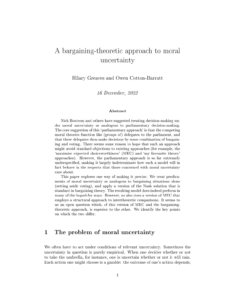A bargaining-theoretic approach to moral uncertainty
Owen Cotton-Barratt (Future of Humanity Institute, University of Oxford), Hilary Greaves (Global Priorities Institute, University of Oxford)
GPI Working Paper No. 2-2023, published in the Journal of Moral Philosophy
This paper explores a new approach to the problem of decision under relevant moral uncertainty. We treat the case of an agent making decisions in the face of moral uncertainty on the model of bargaining theory, as if the decision-making process were one of bargaining among different internal parts of the agent, with different parts committed to different moral theories. The resulting approach contrasts interestingly with the extant “maximise expected choiceworthiness” and “my favourite theory” approaches, in several key respects. In particular, it seems somewhat less prone than the MEC approach to ‘fanaticism’: allowing decisions to be dictated by a theory in which the agent has extremely low credence, if the relative stakes are high enough. Overall, however, we tentatively conclude that the MEC approach is superior to a bargaining-theoretic approach.
Other working papers
Choosing the future: Markets, ethics and rapprochement in social discounting – Antony Millner (University of California, Santa Barbara) and Geoffrey Heal (Columbia University)
This paper provides a critical review of the literature on choosing social discount rates (SDRs) for public cost-benefit analysis. We discuss two dominant approaches, the first based on market prices, and the second based on intertemporal ethics. While both methods have attractive features, neither is immune to criticism. …
Evolutionary debunking and value alignment – Michael T. Dale (Hampden-Sydney College) and Bradford Saad (Global Priorities Institute, University of Oxford)
This paper examines the bearing of evolutionary debunking arguments—which use the evolutionary origins of values to challenge their epistemic credentials—on the alignment problem, i.e. the problem of ensuring that highly capable AI systems are properly aligned with values. Since evolutionary debunking arguments are among the best empirically-motivated arguments that recommend changes in values, it is unsurprising that they are relevant to the alignment problem. However, how evolutionary debunking arguments…
Crying wolf: Warning about societal risks can be reputationally risky – Lucius Caviola (Global Priorities Institute, University of Oxford) et al.
Society relies on expert warnings about large-scale risks like pandemics and natural disasters. Across ten studies (N = 5,342), we demonstrate people’s reluctance to warn about unlikely but large-scale risks because they are concerned about being blamed for being wrong. In particular, warners anticipate that if the risk doesn’t occur, they will be perceived as overly alarmist and responsible for wasting societal resources. This phenomenon appears in the context of natural, technological, and financial risks…

